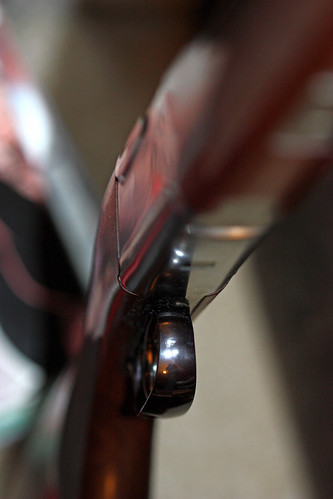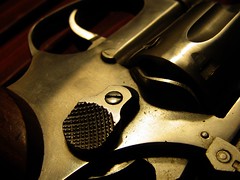
So {insert title here}, Book 1 of the Acradea Cycle, is proceeding. It’s in fits and starts a bit, but a little kick in the pants from Ye Olde Magickal Speaking Beardface should keep things chugging along. At least a thousand words a day is a decent goal. As my northern better half points out, I do that in my blog every day without breaking a sweat. But I’m coming to a point in the novel where I need to name something of relatively large importance.
When I last discussed The Project at length, I mentioned “magical mass acceleration rifles.” They’re a weapon being developed by the magocracy in the Cities of Light for a few reasons that will come to light over the course of the story. But the new-fangled dealers of death need a shorthand name. Mass acceleration isn’t a scientific theory as such in Acradea, and calling them “metal tubes with wooden stocks etched with runes and Wards to conjure the ammunition and move it down the barrel at lethal velocity” neither rolls off of the tongue nor abbreviates well.
Considering these are the first “firearms” of this world, I’m inspired to look towards our own history of boomsticks. The weapons in Acradea do have a method of arming similar to those used back when matches or flint were used to strike the gunpowder. By pulling back on the hammer of one of these new-fangled weapons, the shot is conjured into the breach and arcane energy is passed from the storage runes to the hammer, acting as the weapon’s primer. Then, pulling the trigger closes the circuit between the hammer and the Wards on the barrel, starting a very rapid sequence of off/on toggles on those Wards which accelerates the shot. While not magical in and of themselves, shots from these weapons are accelerated by magic to speeds exceeding that of sound, and are likely to have decent range and accuracy if used properly.
When firearms began evolving as small arms, they were known by their firing mechanisms – matchlocks, wheellocks, flintlocks, etc. “Magelock” is an interesting choice but Privateer Press called dibs on that one. “Arcanelock” or “arcanolock” might work, or perhaps “wardlock.” I’d like to try and settle on a name for them before I proceed with the current scene, as it’s about to become very important to the plot.
So, if you’ve any ideas or just want to kibitz about what I’ve mentioned, leave me a comment, won’t you?
As an aside, if you’re hungry for inspiration, take a look at Chuck’s photostream sometime. The man has got a great eye.

Seriously. That’s what I’m talking about.
EDIT: Some GREAT suggestions and background info in the comments. Thanks, everyone.
Considering these weapons were originally designed to provide long-range protection to Guardians, who don’t have many options in terms of doing damage at long distance compared to evokers who can shoot lightning and alchemists who can transmute air to fire, I’m thinking… “longpro” or some other portmanteau of those terms. Thoughts?
EDIT 2: My Canadian better half said something surprisingly smart, to the effect that I’m over-complicating matters. The term ‘firearm’ might still work, especially if the look of the weapon when being shot has a resemblance to fire and it acts as an extension of the shooter’s arm. I just want to avoid pissing of intelligent people who make arguments like the following:
Prior to the age of gunpowder, there’s no such thing as “firing” a weapon, but there are all sorts of “historical” books and films that will have commanders instructing crossbowmen or longbowmen to “fire” at a target. It’s a habit that’s hard to avoid, but it always sets off a “this-guy-didn’t-do-the-research” neuron in my brain.
EDIT 3: “Executor.” It carries out the protection, or judgement, or execution of the mage holding it.
And since it’ll play a pivotal role in how the story unfolds, and the major complication that sets off the main story, perhaps I’ve finally come to my title – “Executor’s Wound”…



April 19, 2010 at 10:28 am
Curselock.
April 19, 2010 at 10:46 am
@Justin – I dig it. Is your thinking that the operator of the weapon is, in effect, ‘cursing’ its target with a conjured lead salad?
April 19, 2010 at 11:14 am
Witchlock? Runelock? Hammerbolt? Or you could just go old school and call it a manganon — “war engine.”
April 19, 2010 at 11:15 am
I think the X-lock terminology doesn’t particularly do for the people at the time to use, however. That is to say, during the era of the matchlock, I doubt anyone spoke of a soldier’s “matchlock”, they had a “Hakenbüchse”/arquebus. Heck, I happen to know by the 1770s, you had a “musket” and the manuals might refer to your “firelock”. That x-lock description is really more common in hindsight, trying to classify the difference between a “true” flintlock and a doglock or a snaphance, or a matchlock vs a serpentine.
Maybe check this link for some other ideas – http://homepages.tig.com.au/~dispater/handgonnes.htm
If they’re really the first firearms, they’re likely to not have much classification, unless you’ve got a lot of different styles already. Otherwise… well, handguns were handgonnes. The blunderbuss’s pistol equivalent was a “dragon” (hence dragoon). Heck, Blunderbuss itself comes from “Donderbus” – thunder-pipe.
Thus, boom-tube might not be too far off, really. Or, at least, “boom-tube” as said in the language of the fey-arms’ inventors and then corrupted. Hell, you could even call them “arquebus” and trace the root word back to Hexenbüchse instead of Hakenbüchse.
Personally, I’d probably just stick to gonnes and similar early-modern terminology – just remember to avoid using the word “fire” for shooting them off, since there’s no longer a fire-based component to your “spellarms”, as it were.
April 19, 2010 at 11:17 am
@Stout – Manganon has a nice ring to it…
@Jason – I can always count on you for historical references. Thanks very kindly. Also while the X-lock nomenclature doesn’t exactly apply to arms powered by magic instead of fire, I figured it was a good starting place for something a bit more descriptive than “magic boomstick”.
April 19, 2010 at 11:48 am
Well, if you’ve got a hammer, and a trigger, there’s some form of “lock”. My point was more that the flintlock/wheelock/matchlock terminology is something I don’t think you’d see people using every day in the period where those weapons are popular – particularly at the beginning, and no more than we refer to our weapons as “cartridge-based” in common parlance now.
From that page I linked to, for example – “It may be of interest to note that the derivation of the word “gun” is from gyn, an abbreviation of engyn, the old English word for a piece of military material, or machine.” The same thing happens in a lot of languages – there’s a term for “weapon soldiers use”, and the meaning changes as the weapons do. Up until firearms were invented, that’s how the German word “Gewehr” functioned – any weapon at all – and after that it only meant “firearm” unless modified.
Basically, I’m just saying that it might be worthwhile to think about how the cultural milieu would derive a name for the weapon, as opposed to trying to horn it into the classification system we developed after we’d had firearms for a couple hundred years. YMMV.
And I mainly mentioned “fire” because it’s one of my pet-peeves in fiction. Prior to the age of gunpowder, there’s no such thing as “firing” a weapon, but there are all sorts of “historical” books and films that will have commanders instructing crossbowmen or longbowmen to “fire” at a target. It’s a habit that’s hard to avoid, but it always sets off a “this-guy-didn’t-do-the-research” neuron in my brain.
April 19, 2010 at 11:58 am
@Jason – hence me calling it a ‘shot’. You ‘shoot’ a ‘shot’, regardless of the method used to propel it.
April 19, 2010 at 12:04 pm
Huzzah! Go you forth and conquer.
April 19, 2010 at 12:06 pm
Yes, he’s leveling the “curse” of violence upon the target. Whether or not that makes sense with the mechanics of the weapon itself or the (meta)physics behind it.
Jason’s idea is really good, too. It may be such a unique situation that it has its own identity in the vernacular, but a more common term is part of that identity.
April 19, 2010 at 12:12 pm
Witchalok is also taken. Sorry. =)
http://www.penny-arcade.com/comic/2009/1/21/
April 19, 2010 at 1:44 pm
Ok, so if I get this right, you’re looking at basically “Thori’Dal, the Star’s Fury” but in gun form (inifinite magic ammo).
Reading your description, I start seeing the people of your world looking more to what it does (instant death, given the speed of the ammo) more than the mechanism itself. A single basic description will alert the reader that it’s a gun.
“Runic Death” “Death’s Curse” “Mage’s Execution” and such are what I’m thinking of.
April 19, 2010 at 1:47 pm
@Cat – Nice WoW reference. 8)
Maybe shorten it to “Executor” or “Executioner”? In that it ‘executes’ threats at long range as they approach the mage?
April 19, 2010 at 2:15 pm
Yeah, that’s exactly what I was thinking. Just focus on the death, and it will sound a lot more natural than trying to make it sound like one of our real world guns. (AMage – 47 :D)
I like Executor (prolly because of the veiled Star Wars reference gives it an ominous tone for me).
And WoW is ftw B)
April 20, 2010 at 3:05 pm
Deuced lack of email updates. I never remember anything if it doesn’t show up in my gmail inbox.
For the record – if there’s a flash of something resembling fire when the hammer drops, I could see people thinking of it as a “firearm” – arms being the general term for weapons anyway.
You might, however, play a little game with “f’rarms” dialectically, as it were. They’re the “arms” that kills from “far” away – the far-arm. You could have Executor as the most recent model of what the trained soldiery call their “far-arms” (as opposed to close-arms combat) and what the untrained, seeing flashes and bangs, hearing commands echo, call “fire-arms.” Hell, having heard officers shout what sounds like “Shole deeor furlog!”* across a field at re-enactments, it wouldn’t surprise me.
I’d still stick with “shooting” them, though, in military parlance.
* – “Shoulder your firelock.”
April 20, 2010 at 4:59 pm
http://en.wikipedia.org/wiki/Gun#Terminology
Apparently not using the term will cause my novel to fall into Did Not Do The Research even more quickly than any other term I make up.
This is according to my lovely wife.
January 28, 2011 at 12:03 pm
Hi, i just thought i’d publish and allow you to know your blogs layout is definitely messed up on the K-Melonbrowser. Anyhow keep up the excellent perform.